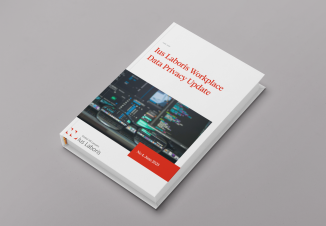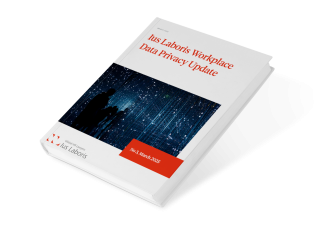
Imagine the situation: You’re at work. You’re busy; too busy, in fact, to notice you’ve been sat down and rooted to the same spot for hours without a break. You’re thirsty, your back probably aches (World Health Organisation data finds lower back pain is one of the top ten contributors to people living with a disability worldwide), and you’re tired. Wouldn’t it be great if an alert could have popped up on your screen after your first hour’s toil, suggesting you take a short break to stretch your legs and get a coffee?
It’s not as outlandish as it seems. Meeting room-booking company Cloudbooking is expanding its typical space booking offering with occupancy sensors – those that register when an employee or freelancer plugs in their work device to start working. As soon as it notices staff are still there and still working when maybe they should have moved by now, an alert can be sent to their screens to suggest they move around and, according to the firm’s CEO Gerry Brennan, it’s the eminently acceptable use of modern-day data collection: “Ask people if they want to be connected to a building in an abstract sort of way and most will probably baulk at the idea,” he says. “But ask if they want their lives to be easier, and you quickly find most people no longer have a problem.” He adds: “Right now, our technology is being developed to include and overlay real-time travel updates to people’s online diaries. Because it knows where you are, and for example, that you need to be somewhere across town by a certain time – it will suggest whether it thinks the user ought to leave now if there are travel delays. That’s when data that knows where staff are becomes really useful.”
As technology becomes more ubiquitous, it’s not surprising more applications like this are being sought to marry staff with data positively. In China, construction firms are reportedly using sensors in workers’ hats to detect fatigue for health and safety reasons and, closer to home, wearable technology has already been deployed amongst workers on Europe’s largest construction project, Crossrail, to measure the same thing. But here’s the question. Where does it all stop? In the early 2000s there were horror stories of call centres using call data to monitor if people were going to the restroom too often, and nearly two decades later, these worries haven’t gone away. Earlier this year, Amazon was granted a patent for a wristband that tracks workers’ locations and picking accuracy – but it’s a move widely seen as more Big Brother than big (and helpful) data.
As with all ethical questions though, there are varying standpoints. Employers have a right to insist their staff be productive (the European Court of Human Rights has found, for instance, that monitoring excessive emailing during work time does not breach privacy rights as long as staff know their company’s policy; while in America firms are allowed to monitor their own equipment), but this bullwhip approach is at odds with the more recent notion that workplaces are social, happy, creative places, where freedom rather than restriction is what creates a good outcome.
Stephanie Raets, lawyer in the Belgian firm Claeys & Engels and Chair of the Data Privacy Expert Group at Ius Laboris, confirms that this employee freedom is also reflected in the General Data Protection Regulation (GDPR): “In order to process personal data of employees (personal data being data that can identify an individual employee), employers always needs a lawful basis. If the processing is necessary, there will be a lawful basis for it, but if it is just ‘nice to have’, the employer will have to obtain consent. And this needs to be freely given, in other words, the employee must not suffer any disadvantage if they don’t consent.”
Anne Gauton, principal, Future People & Organisation, at Capgemini says: “Given the pace of change, achieving a perfect balance between what is desirable and what is ethical in data collection to improve the workplace is probably an unrealistic aim.” She adds: “What is perhaps more important is to recognise how ethics in general are rising up the corporate agenda – particularly amongst millennials. Companies now need to live up to a set of ethical expectations – and certain data collection may be incompatible with this.”
From what little research there is on the topic, the consensus seems to be that employees will tolerate data collection where it is easily identifiable – like that from wearables. Research by PA Consulting last year found 70 per cent of employees it polled said they would “be comfortable working for an organisation that mandated the use of wearable devices for certain jobs.” When staff were asked if they would be comfortable being given preferential treatment in return for bosses receiving continuous health information from a fitness bracelet, acceptance was even higher – 90 per cent. Where there’s benefit to wearing them, it seems staff aren’t worried.
What’s complicating things, however, is that as well as new data being collected, there’s now the possibility of more intelligent use of data that had hitherto been collected just for procedural reasons, but which now – with the advent of big data, AI and HR analytics – can be used in ways not initially considered.
Data governance firm Exonar helps firms globally deal with different data compliance laws. Its CEO, Julie Evans, says: “With the rapid growth of analytics, employers may find themselves being able to make connections they hadn’t anticipated.” For instance, HR analytics is now able to use standard performance data, but cross reference it with absence data, colleague 360-degree reviews and even disciplinary data to work out new metrics – such as a likelihood of them quitting – a vital task for talent management. As respondents from Ius Laboris’s forces for change research confirm, 27 per cent of respondents think AI and data analytics now has the best potential to improve employee management and performance in the workplace. But maybe it’s only the case if they tread carefully. Is it ethical for instance, that companies share the improved health data they might have from health and wellbeing interventions to negotiate better corporate-level health insurance?
“Companies now need to live up to a set of ethical expectations – and certain data collection may be incompatible with this”
Anne Gauton, principal, Future People & Organisation, at Capgemini
According to Gauton, employers are definitely approaching uncertain times. She says: “As we move to more ‘smart’ working environments, the types of personal data available to employers will change yet again, including even physiological data. This goes beyond the activity-type tracking that wearables deliver today.” She asks: “Does concern about staff wellbeing justify analysis of this type of data? Could an argument be made that identifying and resolving key stressors in the workplace using physiological data might reduce mental health issues for employees?” However, Raets adds: “The kind of data that can reveal information about someone’s health status, can generally not be processed by employers in the EU, unless it is necessary to comply with the legal obligations or local laws allow employees to consent to the processing of it.” So, in the EU at least, protections against the use of sensitive data are already in place.
The problem with achieving a perfect balance is that when firms introduce something that benefits staff, it’s typically done to benefit them too – and they want ROI information to show it – which means holding and storing some data related to it. For instance, some employers are now starting to offer debt consolidation services, where an employees’ debt is accumulated, and more manageable repayments are made through payroll. The lure for employers is that staff see reduced stress and anxiety (and maybe even reduced long-term absence) caused by poor financial wellness issues. But this does mean employers will store (and potentially use for other purposes) data about who amongst their staff are under serious financial strain.
One source of relief could be from the GDPR, which provides that firms have had to be much more explicit about how the data they hold on staff will be stored and used. The regulations put greater emphasis on getting freely given consent from employees about the storage of their personal data, and they require that there is better communication about how that data will be interrogated. For some this is a helpful intervention to ensure ethical issues are confronted head-on. “The way the business values its employees and behaves towards them inevitably shapes the degree of trust that employees have. That level of trust extends to handling and sharing their personal data,” says Gauton. “For HR, this means ensuring that data is held only where there is legitimate interest in improving the workplace that outweighs general privacy concerns.” Indeed, as Raets clarifies from a legal point of view: “Legitimate interest in itself is not sufficient within the EU. The processing should also be necessary for the purposes of this legitimate interest.”
What’s certainly the case is that organisations are themselves still anxious about how to deal with employee information. Deloitte’s latest Human capital 2018 trends report finds just ten per cent of firms say they are ‘very ready’ to meet this challenge. But while 60 per cent of employers claim they are worried about employee perceptions about how data is being used, firms do seem to be displaying bravery.
Maybe more firms do just need to test the water, to find out for themselves whether new data initiatives are accepted or rejected. In other words – given not everyone reacts the same, at least this way they’ll know where their own people’s ethical lines in the sand are.
As Rob O’Donovan, co-founder of CharlieHR, concludes: “When you’re talking about ethics, you’re really talking about communication. The only way to balance the ethics of data capture is full transparency. All companies need to communicate what data they are collecting and how they are using it.”


